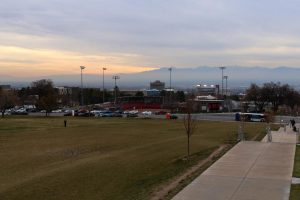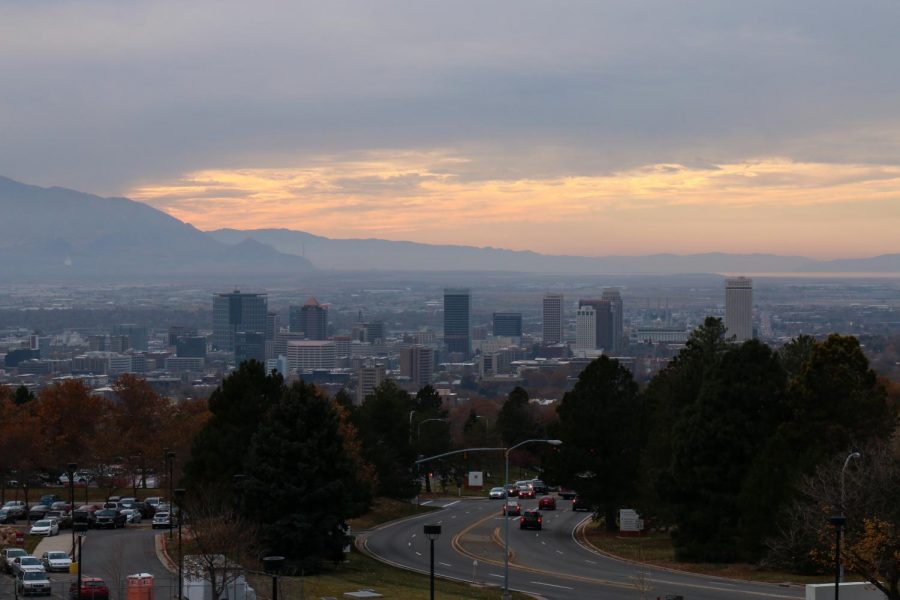Christopherson: Children’s Sports Shouldn’t Play On Bad Air Days
Inversion in Salt Lake City, UT on Friday, Nov. 10, 2017. (Photo by Curtis Lin/ Daily Utah Chronicle)
November 22, 2019
Everyone knows that Utah has terrible air. In 2017, the American Lung Association ranked Salt Lake City’s air quality “the sixth worst in the nation,” which will not surprise anyone who lives here. Pollution is as much a part of our lives and consciousness as the beautiful mountains or the state’s predominant religion — ubiquitous and unavoidable. In fact, air quality is among Utahns’ top concerns for the future of the state and their own communities.
Utahns dread the thick smog that smothers the valleys every winter and obscures the natural beauty of our landscape. Even during these last relatively warm days in November, I have noticed that the Oquirrh Mountains are already hidden from view by a brownish-gray haze, and this is just a taste of the inversion to come. By January, the gunk in our air will be more consistent and concentrated, driving tourists away and pushing us inside despite the amazing scenery and recreation. Unfortunately, the summer is likely to be just as bad.
Utah has the highest birth rate and highest percentage of children of any state, and few are hit harder by poor air quality than Utah’s kids. I think most Utahns would agree that the last thing these thousands of kids need is to be running and playing outside in cancerous air, but they often do it anyway during recess or outdoor sports. Until we can get our air quality to consistently healthy levels, Utah needs laws to cut down on these activities during bad air days.
Breathing smog is dangerous for everyone, but it’s especially bad for children, as their lung development in still in progress. A project called the Children’s Health Study found that kids who grow up breathing dirty air have a substantially greater risk of reduced lung growth, especially when they spend a lot of time outdoors.
The Utah Department of Health has issued guidelines based on these adverse health effects. These guidelines suggest when schools should schedule indoor recess based on air quality, recommending that all students stay indoors on red air days, or days when PM2.5 levels exceed 55.4 micrograms per cubic meter of air. They recommend that students with respiratory symptoms, asthma, cystic fibrosis, congenital heart disease and other respiratory problems stay indoors even on days with lower pollution levels.

These guidelines are certainly useful and important, but they do not adequately protect Utah’s kids. They’re merely recommendations – not enforceable regulations – meaning children whose parents and teachers don’t have air quality on their immediate radar may well be playing outside during even the most dangerous days. Equally concerning is the lack of regulations for outdoor sports.
For children and teenagers on competitive teams, there’s an expectation to show up and play hard at games and practices – even if the air is visibly unhealthy. My sister, who played soccer for our high school’s varsity girls’ team, recalls having to practice once in smoke so thick she couldn’t see ten feet ahead, her coach’s expectations for attendance, speed and aggression evidently unaltered by the legitimately carcinogenic circumstances.
In my experience, most coaches of competitive club or high school sports are similarly demanding. This is understandable, as high expectations are positive and necessary to teach kids to work hard, depend on each other and push themselves to improve. Cancelling a practice over air pollution might seem like a significant sacrifice, especially since Utah has so many dangerously bad air days. But the bottom line of child sports is and should be children’s health and well-being, and if parents and coaches won’t keep kids from playing in bad air, our lawmakers should.
It goes without saying that this proposal is not a long-term or remotely holistic solution to Utah’s air quality problem – it’s a complex issue that dozens of organizations in our state, from the legislature to Envision Utah to the Utah Clean Air Alliance, have been working to address for years. In fact, my parents have a decade-old photo of my athlete sister as a little girl, using the grooves in the granite of the State Capitol Building to climb the walls during a rally with Utah Moms for Clean Air, of which our mother was an early member.
Cleaning Utah’s air will continue to require individual activism and sacrifice, innovation in transportation technology and city planning, and commitments to sustainability in municipalities and state government. However, change isn’t going to happen overnight, and Utah kids need protection now. Regulating outdoor sports on bad air days is an important part of keeping our children healthy as we continue to work toward long-term solutions.









Kyle B • Jan 17, 2020 at 2:19 am
Kids are 18 are among the most impacted by poor air quality. Even when a healthy adult is able to be outside without protection, kids still fall under the ‘sensitive groups’ category, which means an AQI score of 100-150 is too much for long-term exposure. (https://www.cleanairresources.com/resources/what-groups-are-most-sensitive-to-air-pollution)